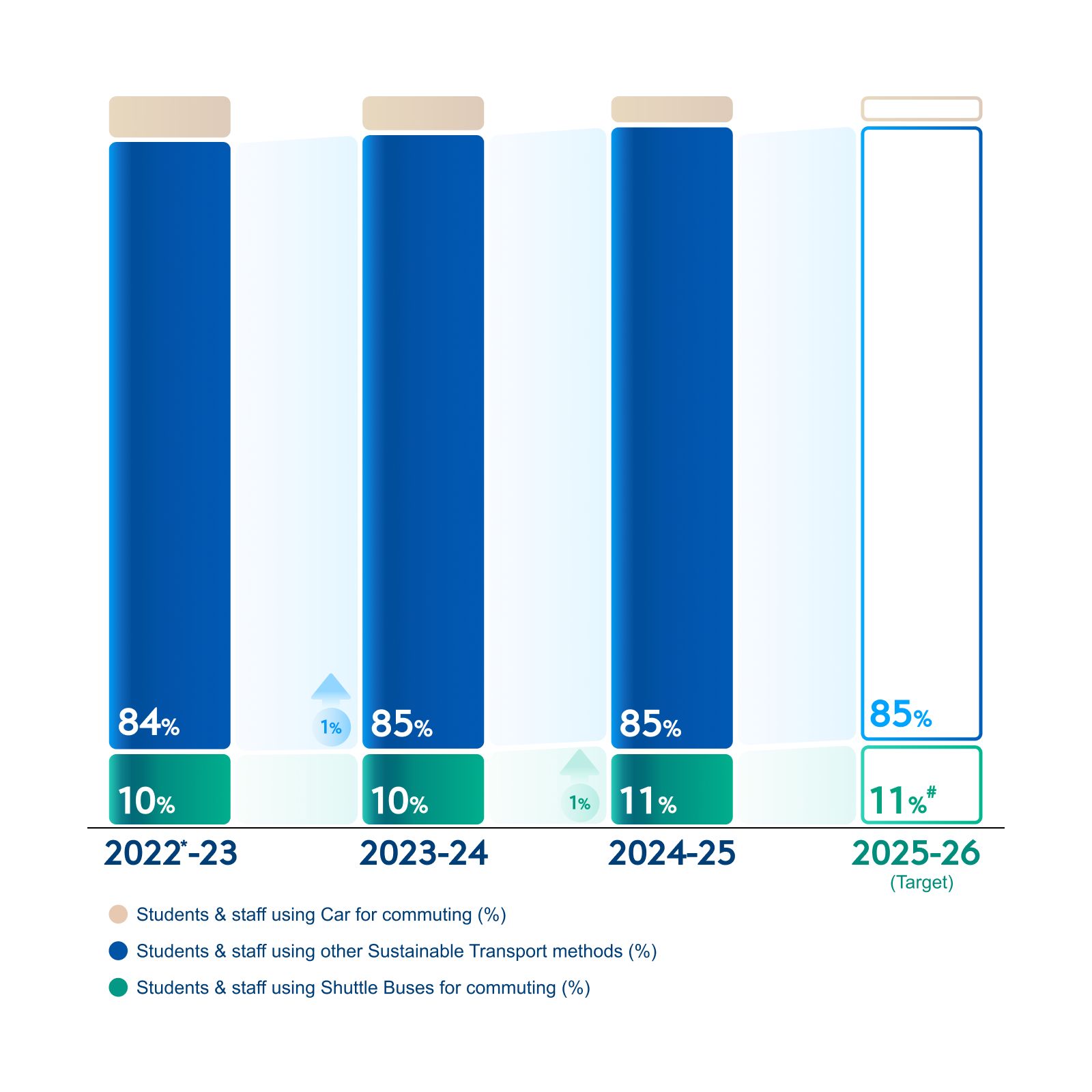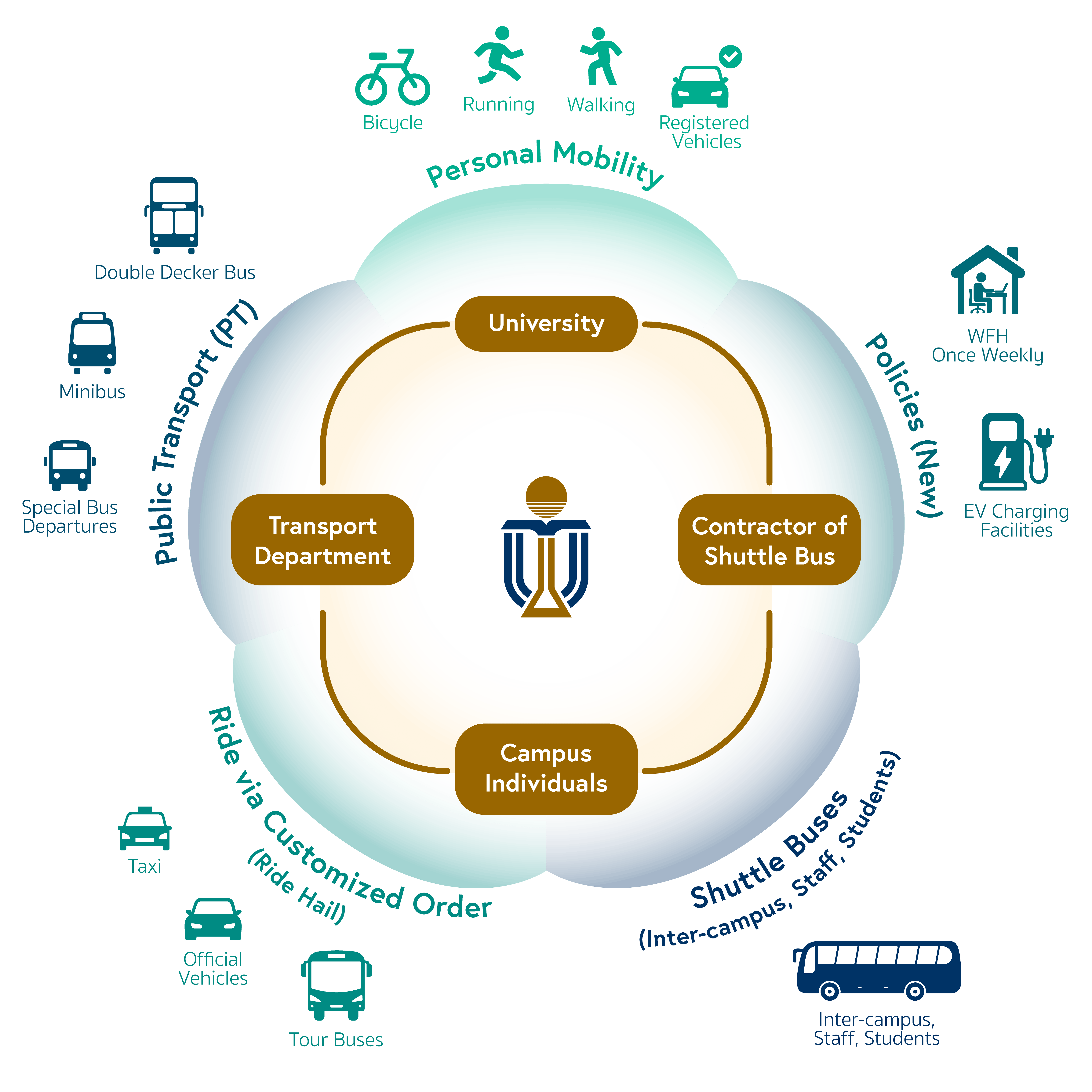Sustainable Commuting
Introduction
In support of the University’s 2028 Sustainability Challenge to achieve net-zero emissions by 2045, we are committed to fostering a culture of sustainable commuting. We encourage all HKUST members to travel to and from campus using environmentally friendly options, such as University shuttle buses and public transport. These services have been continuously enhanced to accommodate our growing community.
Our shuttle bus service (click here for details) covers an extensive network across Hong Kong Island, Kowloon, and the New Territories, with 19 routes and over 50 stops. Currently, 11% of University members commute via shuttle buses, while 85% use public transport, walk, or cycle. Only about 4% rely on private cars. To further promote sustainable commuting, we aim to increase shuttle bus ridership and encourage the use of double-decker buses for public transport.
Our goal is to maintain sustainable commuting at 96% (including shuttle buses, public transport, walking, and cycling) while accommodating growth in our student and staff population. Additionally, we have:
-
Expanded EV charging facilities, adding 99 dedicated spots for electric vehicles.
-
Implemented work-from-home arrangements for non-academic staff to reduce commuting emissions.
Together, these efforts advance our commitment to a greener campus.

* In 2022, the University has resumed normal operation after COVID.
# With opening of huge student quarters (with 1551 hall places) and more users choose to use shuttle bus service.

Promoting Sustainable Commuting at HKUST
HKUST is committed to achieving its sustainable commuting goals through a comprehensive strategy. This includes continuous stakeholder engagement, improved public transport services, and enhanced on-campus infrastructure to support eco-friendly travel. Below are our key initiatives and future plans:
Collaborative Transport Planning with Authorities
At HKUST, we maintain a strong partnership with the Transport Department (TD) to ensure efficient and sustainable transportation for our University community. This collaboration encompasses both regular operations and special event planning. We have established a system of ongoing meetings with the TD and relevant operators, creating a platform for continuous review and improvement of public transport services. These sessions allow us to address the evolving needs of our university community while promoting sustainable commuting options.
Our collaboration extends to coordinating additional public transport services for high-attendance occasions, such as Spring/Fall term commencements, Congregation, Information Day, and new student welcoming events. This proactive approach ensures that we can accommodate increased transportation demands during these peak periods while maintaining our commitment to environmental consciousness. For a detailed overview of our transportation planning for major events, please click here to view.
Services Promotion Strategy
Our multi-faceted promotion campaign aims to encourage all University members to utilize public transport and shuttle bus services, particularly during the commencement of academic terms. This initiative includes setting up informational booths in high-traffic campus areas and disseminating electronic messages to staff and students through various channels. For more details on our promotional efforts, please click here to view.
Expanding Electric Vehicle Infrastructure
As part of our sustainability commitment, HKUST is gradually expanding electric vehicle support across campus. Our current plans include increasing EV charging availability from 1% of parking spaces in 2021 to 30% (about 360 charging spots) by 2028. At the same time, we're progressively replacing our official vehicles with electric models as part of our broader efforts to reduce transportation emissions.
Transitioning to Electric Campus Transportation
As part of our sustainable transport strategy, HKUST is introducing electric buses to campus operations. We are currently collaborating with our staff bus contractor to transition part of their fleet to electric vehicles, with implementation planned for the third quarter once charging infrastructure is completed in 2025. This initiative marks another step in reducing our carbon emissions and dependence on fossil fuels.
Collaboration for Greener Public Bus Services
In partnership with KMB, Hong Kong's largest franchise bus company, we are increasing the number of buses equipped with solar panel systems on HKUST routes. These innovative buses directly channel solar-generated electricity to their main batteries, enhancing energy efficiency. Additionally, HKUST is pioneering the integration of public bus stops within the campus, encouraging the use of higher-capacity double-decker buses and promoting more sustainable mass transit options. Fuel bus running within the campus have been scheduled to be replaced with electric bus in the fourth quarter 2025.
Sustainable University Fleet Management
Our commitment to sustainable transportation extends to our official vehicle fleet, which now comprises electric and hybrid Multi-Purpose Vehicles (MPVs). These vehicles serve various essential functions, including staff transportation for meetings, conferences, speaking engagements, and airport pickups, demonstrating our dedication to reducing emissions across all university operations.
Flexible Work Arrangements
To further reduce commuting-related emissions, we have introduced flexible work arrangements for non-academic staff in late 2024. Eligible employees now have the option to work from an alternative location one day per week, subject to operational requirements. This initiative not only promotes work-life balance but also contributes to our overall sustainable commuting goals by reducing the frequency of campus commutes.
Expanding Eco-Friendly Shuttle Bus Services
HKUST is pioneering the adoption of electric buses for our shuttle service, despite the unique challenges presented by Hong Kong's demanding topography. As the first non-franchise bus operator to attempt such an initiative in these geographical conditions, we are charting new territory in sustainable campus transportation. Our extensive network, comprising 19 routes with over 50 stops across the New Territories, Kowloon, and Hong Kong Island, serves as the testing ground for this important transition.
In our 2025 implementation plan, we will convert 8% of the fleet to electric buses, pending completion of the University's charging infrastructure in the third quarter. This cautious yet determined approach reflects both our commitment to sustainability and our recognition of the technical challenges involved. The hilly terrain, lack of precedents, and infrastructure requirements present significant hurdles that we are systematically addressing through close collaboration with operators and technical experts.
While acknowledging these challenges, we view them as valuable opportunities to innovate and establish best practices for sustainable transportation in Hong Kong's unique environment. Our team remains focused on developing practical solutions that balance environmental benefits with operational reliability, ensuring our shuttle service continues to meet the needs of our campus community while reducing our carbon footprint. This initiative represents an important step in HKUST's broader commitment to sustainable mobility and environmental leadership.
Updated on 21 July 2025
